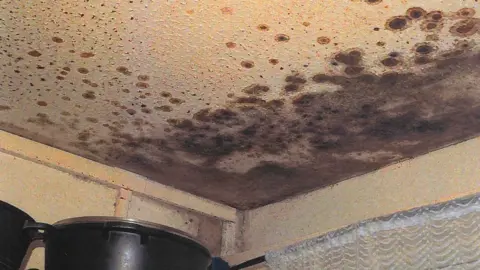Awaab Ishak: Rochdale housing boss admits 1,800 homes have mould
 Family handout
Family handoutThe boss of a housing association which owned the mouldy flat where toddler Awaab Ishak died has admitted more than 1,800 homes have issues with damp.
Interim chief executive Yvonne Arrowsmith said she was "ashamed" of the "very high" number.
She took charge of Rochdale Boroughwide Housing (RBH) in December after the previous incumbent was sacked.
Two-year-old Awaab died from a respiratory condition caused by exposure to mould in his home.
Ms Arrowsmith said the numbers were likely to be even higher and promised changes were afoot.
She told BBC Radio Manchester: "They are very high numbers and I don't think it's anything that anyone can be anything but ashamed about because people shouldn't be living in those conditions."
She was speaking after the Regulator of Social Housing recently estimated 120,000 to 160,000 social homes in England had "notable" issues with mould.
RBH, which has 12,500 properties in the borough, was widely criticised after a the coroner's conclusion regarding Awaab's death.
 Rochdale Coroner's Office
Rochdale Coroner's OfficeThe boy's father had repeatedly raised the issue with the housing association but no action was taken.
RBH was consequently stripped of £1m in funds for new housing by the government, with Housing Secretary Michael Gove saying it had "failed its tenants".
Ms Arrowsmith said none of the current cases were categorised as very high priority.
"If there were any that were a very high-risk and there was a high level of vulnerability, we would move the tenants while the treatment was being carried out," she said.
She said previous surveys "weren't highlighting damp and mould as a major issue", adding: "The thing for me was if we didn't know this, what else don't we know?"
She said an external report was being compiled about mistakes at RBH, which is expected to be published in April.
'Lack of trust'
RBH recently released a recovery plan, with Ms Arrowsmith pledging to find out what went wrong and what should change in the future.
She said they were trying to improve communication with residents and make the complaints process more accessible.
Residents have complained about overcrowding, dust and cleanliness along with a lack of trust in RBH.
Ms Arrowsmith said: "I think there is definitely a loss of trust and confidence and that's something we have to work really hard on."
She found there were some tenants who were "really happy" but "too many who weren't so that is where our priorities are".
On Thursday, the government vowed to crack down on damp and mould under new legislation in memory of Awaab.
The government has tabled amendments to the Social Housing Regulation Bill to introduce "Awaab's Law", which will require landlords to fix reported health hazards within specified timeframes.
A consultation will be launched later this year to set the timeframes within which landlords will have to act to investigate hazards and make repairs.

Analysis
Abbie Jones, BBC Social Affairs Correspondent
After the inquest into Awaab's death, I visited the Freehold estate and it wasn't hard to find people who wanted to show me the shocking conditions they were living in.
In one home the smell of damp hit us as soon as we opened the door. There was black mould in the kitchen cupboards, on the walls and in the children's bedrooms.
Round the corner another parent said he and his children were sleeping in one room because of mould - but they were now all preparing to decamp to the sitting room every night because the damp had spread.
They said they had been complaining to RBH for four years, long before Awaab Ishak's death.
The worst case of mould I saw was in a flat on the same block where the kitchen ceiling was a sea of black. This resident said he'd lived with the problem for even longer.
More tenants approached us and told us about their mould problems. We did also meet people who said they didn't have any issues and their homes were dry.
We've kept in touch with the people we visited, and most have said RBH had been out regularly to treat the mould since the BBC reported on the problems.
One resident has been promised a new kitchen. But they've all expressed doubts that the work would have been done if it wasn't for the media spotlight that was shone on the estate - and RBH - since Awaab's tragic death.

Why not follow BBC North West on Facebook, Twitter and Instagram? You can also send story ideas to [email protected]
